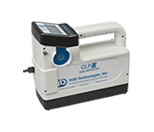Hydrogen sulfide (H2S) is a flammable and explosive gas, and can also be toxic when inhaled. It’s heavier than air, so it tends to collect in poorly ventilated, low-lying areas such as basements, wells, and sewer lines. Because of its inherent danger, it’s important to respond appropriately if your H2S monitor alerts you to the presence of this gas.
Get out of the Area
The first thing to do when your H2S gas detector goes off is to get out of the area as quickly as possible. If you have safety gear, put it on at this time. Jobs with a higher risk of hydrogen sulfide exposure–such as water treatment plants and oil drilling operations–often have H2S safety gear and are required to teach their employees how to properly use it.
To get out of the reach of the gas, get upwind. If you can, it can also help to get up higher–remember, hydrogen sulfide tends to sink down to low, confined areas.
Account for All People
Once you’re safe, start checking to see if everyone else was able to get out of the area successfully. Hopefully, they all heard the H2S gas monitor alarm and were able to get out in a timely fashion. If you’re on the job, your training should include protocol for where to meet and how to make sure everyone is accounted for. If you’re at home, make sure all members of your family know where to go in case of an emergency.
Notify the Authorities
After you’ve made sure that everyone is safe, call the local authorities to let them know of the hydrogen sulfide exposure. This will ensure that the site is properly evacuated, as well as nearby homes or businesses that may be affected as well. Also, inform the authorities if you weren’t able to account for everyone: they’ll need to send in rescuers with the appropriate training and gear for a hydrogen sulfide emergency.
Ventilate the Area
The final step to dealing with a hydrogen sulfide emergency is to ventilate the area to let the dangerous gas disperse safely. The authorities will take charge of this process so you won’t be at risk of exposure. You should also find out if there are steps you can take to prevent the problem from happening again.







